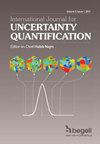随机谱嵌入
IF 1.8
4区 工程技术
Q2 ENGINEERING, MULTIDISCIPLINARY
International Journal for Uncertainty Quantification
Pub Date : 2020-04-09
DOI:10.1615/int.j.uncertaintyquantification.2020034395
引用次数: 18
摘要
构建能够以较低的计算成本准确模拟复杂模型行为的近似是不确定性量化的一个重要方面。尽管具有灵活性和效率,但经典的替代模型(如Kriging或多项式混沌展开)往往难以处理高度非线性、局部化或非平稳的计算模型。本文提出了一种基于递归嵌入局部谱展开的序列自适应代理建模方法。它是通过输入域的不交递归划分来实现的,该划分包括将后者依次划分为较小的子域,并在每个子域中构建更简单的局部谱展开,利用复杂性与局部性之间的权衡。由此产生的扩展,我们称之为“随机谱嵌入”(SSE),是模型响应的分段连续逼近,显示出有希望的逼近能力,并且与问题维数和训练集的大小都有良好的缩放。我们最后展示了该方法如何在一组具有不同复杂性和输入维数的模型上优于最先进的稀疏多项式混沌展开。本文章由计算机程序翻译,如有差异,请以英文原文为准。
STOCHASTIC SPECTRAL EMBEDDING
Constructing approximations that can accurately mimic the behavior of complex models at reduced computational costs is an important aspect of uncertainty quantification. Despite their flexibility and efficiency, classical surrogate models such as Kriging or polynomial chaos expansions tend to struggle with highly non-linear, localized or non-stationary computational models. We hereby propose a novel sequential adaptive surrogate modeling method based on recursively embedding locally spectral expansions. It is achieved by means of disjoint recursive partitioning of the input domain, which consists in sequentially splitting the latter into smaller subdomains, and constructing a simpler local spectral expansions in each, exploiting the trade-off complexity vs. locality. The resulting expansion, which we refer to as "stochastic spectral embedding" (SSE), is a piece-wise continuous approximation of the model response that shows promising approximation capabilities, and good scaling with both the problem dimension and the size of the training set. We finally show how the method compares favorably against state-of-the-art sparse polynomial chaos expansions on a set of models with different complexity and input dimension.
求助全文
通过发布文献求助,成功后即可免费获取论文全文。
去求助
来源期刊

International Journal for Uncertainty Quantification
ENGINEERING, MULTIDISCIPLINARY-MATHEMATICS, INTERDISCIPLINARY APPLICATIONS
CiteScore
3.60
自引率
5.90%
发文量
28
期刊介绍:
The International Journal for Uncertainty Quantification disseminates information of permanent interest in the areas of analysis, modeling, design and control of complex systems in the presence of uncertainty. The journal seeks to emphasize methods that cross stochastic analysis, statistical modeling and scientific computing. Systems of interest are governed by differential equations possibly with multiscale features. Topics of particular interest include representation of uncertainty, propagation of uncertainty across scales, resolving the curse of dimensionality, long-time integration for stochastic PDEs, data-driven approaches for constructing stochastic models, validation, verification and uncertainty quantification for predictive computational science, and visualization of uncertainty in high-dimensional spaces. Bayesian computation and machine learning techniques are also of interest for example in the context of stochastic multiscale systems, for model selection/classification, and decision making. Reports addressing the dynamic coupling of modern experiments and modeling approaches towards predictive science are particularly encouraged. Applications of uncertainty quantification in all areas of physical and biological sciences are appropriate.
 求助内容:
求助内容: 应助结果提醒方式:
应助结果提醒方式:


